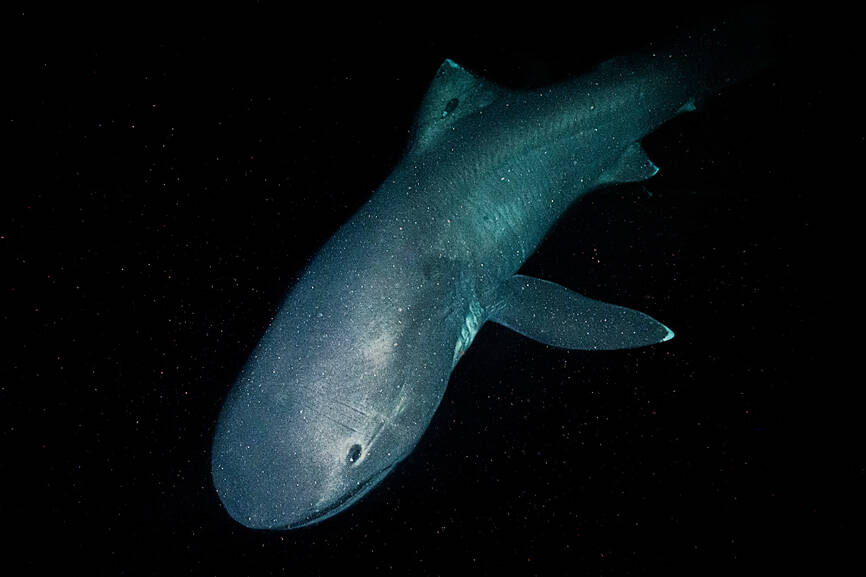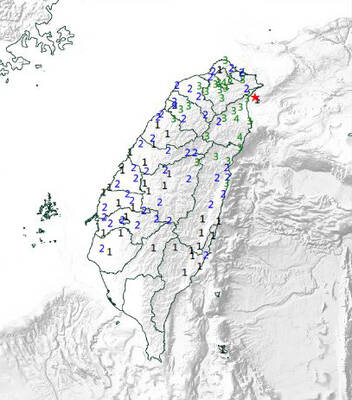Satellite tag technology has facilitated observations of the movement patterns of large fish in waters around Taiwan, the Ocean Conservation Administration (OCA) said on Friday.
The agency said that it has been collaborating with the Fisheries Research Institute since 2021 to track the movements of fish such as megamouth sharks by installing pop-up satellite archival tags on them.
The tags can accurately record the movements of the fish, the depths they swim at and the temperature of the water, it said, adding that when the tags detach, they float to the surface and transmit the data back to the research team via satellite.

Photo courtesy of the Ocean Conservation Administration
Data on 18 fish from nine species have been recorded — three whale sharks, two megamouth sharks, two winghead sharks, two bowmouth guitarfish, a bottlenose wedgefish, two Taiwanese wedgefish, three shortfin mako sharks, a longfin mako shark and two thresher sharks, the OCA said.
The data from the megamouth sharks were especially valuable, as there have been fewer than 300 reported sightings or catches of the species since the first one was discovered in waters off Hawaii in 1976, it said, adding that more than half of the reports were near Taiwan.
The Fisheries Agency in 2020 promulgated a megamouth shark fishing ban, the OCA said.
The data from the tags showed that the two megamouth sharks typically swam at a depth of 400m to 600m in the daytime, and at about 200m at night, it said.
They lead such a “life of two cities” by alternating between deep and shallow waters, probably to catch prey such as krill, it added.
The data showed that the bottlenose wedgefish tended to swim at 7.5m to 42m and in waters of 25.1°C to 28.9°C, while the Taiwanese wedgefish preferred waters no deeper than 28m at temperatures ranging from 26.75°C to 32.25°C, it said.
The data would be used to formulate ocean conservation policies, it added.

A 72-year-old man in Kaohsiung was sentenced to 40 days in jail after he was found having sex with a 67-year-old woman under a slide in a public park on Sunday afternoon. At 3pm on Sunday, a mother surnamed Liang (梁) was with her child at a neighborhood park when they found the man, surnamed Tsai (蔡), and woman, surnamed Huang (黃), underneath the slide. Liang took her child away from the scene, took photographs of the two and called the police, who arrived and arrested the couple. During questioning, Tsai told police that he had met Huang that day and offered to

LOOKING NORTH: The base would enhance the military’s awareness of activities in the Bashi Channel, which China Coast Guard ships have been frequenting, an expert said The Philippine Navy on Thursday last week inaugurated a forward operating base in the country’s northern most province of Batanes, which at 185km from Taiwan would be strategically important in a military conflict in the Taiwan Strait. The Philippine Daily Inquirer quoted Northern Luzon Command Commander Lieutenant General Fernyl Buca as saying that the base in Mahatao would bolster the country’s northern defenses and response capabilities. The base is also a response to the “irregular presence this month of armed” of China Coast Guard vessels frequenting the Bashi Channel in the Luzon Strait just south of Taiwan, the paper reported, citing a

BETTER SERVICE QUALITY: From Nov. 10, tickets with reserved seats would only be valid for the date, train and route specified on the ticket, THSRC said Starting on Nov. 10, high-speed rail passengers with reserved seats would be required to exchange their tickets to board an earlier train. Passengers with reserved seats on a specific train are currently allowed to board earlier trains on the same day and sit in non-reserved cars, but as this is happening increasingly often, and affecting quality of travel and ticket sales, Taiwan High-Speed Rail Corp (THSRC) announced that it would be canceling the policy on Nov. 10. It is one of several new measures launched by THSRC chairman Shih Che (史哲) to improve the quality of service, it said. The company also said

A magnitude 6 earthquake last night at 9:11pm struck off northeastern Yilan County, the Central Weather Administration (CWA) said. The earthquake’s epicenter was located in waters between Toucheng Township (頭城) and Turtle Island (Gueishan Island, 龜山島), about 22.1km northeast of Yilan County Hall at a depth of 112km, CWA data showed. There were no immediate reports of damage. The earthquake’s intensity, which gauges the actual effects of a temblor, was highest in Yilan’s Dongshan (冬山) and Nanao (南澳) townships and Taipei’s Xinyi District (信義), where it measured 4 on Taiwan’s seven-tier intensity scale. It measured 3 in other areas of Yilan and Taipei, as